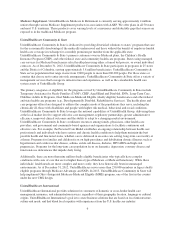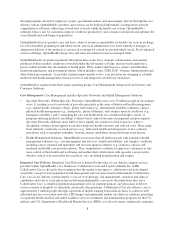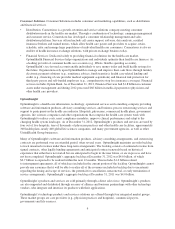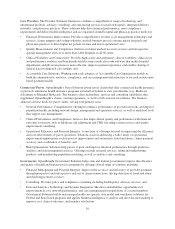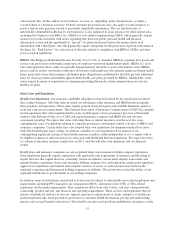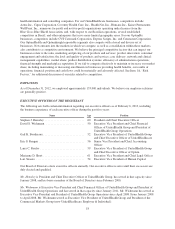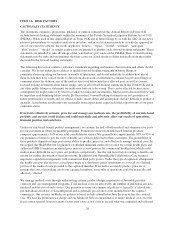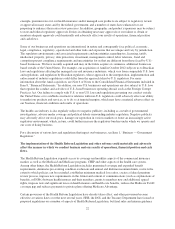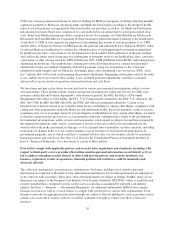United Healthcare 2012 Annual Report Download - page 18
Download and view the complete annual report
Please find page 18 of the 2012 United Healthcare annual report below. You can navigate through the pages in the report by either clicking on the pages listed below, or by using the keyword search tool below to find specific information within the annual report.range of activities, including kickbacks for referral of members, billing unnecessary medical services and
improper marketing. Certain of our businesses are subject to state general agent, broker, and sales distributions
laws and regulations. Our UnitedHealthcare Community & State, UnitedHealthcare Medicare & Retirement and
certain Optum businesses are subject to regulation by state Medicaid agencies that oversee the provision of
benefits to our Medicaid and CHIP beneficiaries and to our dually eligible beneficiaries. We also contract with
state governmental entities and are subject to state laws and regulations relating to the award, administration and
performance of state government contracts.
Guaranty Fund Assessments.Under state guaranty fund laws, certain insurance companies (and HMOs in some
states), including those issuing health, long-term care, life and accident insurance policies, doing business in those
states can be assessed (up to prescribed limits) for certain obligations to the policyholders and claimants of insolvent
insurance companies that write the same line or lines of business. Assessments generally are based on a formula
relating to premiums in the state compared to the premiums of other insurers and could be spread out over a period of
years. Some states permit member insurers to recover assessments paid through full or partial premium tax offsets.
Pharmacy Regulation. OptumRx’s mail order pharmacies must be licensed to do business as pharmacies in the
states in which they are located. Our mail order pharmacies must also register with the U.S. Drug Enforcement
Administration and individual state controlled substance authorities to dispense controlled substances. In many of
the states where our mail order pharmacies deliver pharmaceuticals there are laws and regulations that require
out-of-state mail order pharmacies to register with that state’s board of pharmacy or similar regulatory body.
These states generally permit the pharmacy to follow the laws of the state in which the mail order pharmacy is
located, although some states require that we also comply with certain laws in that state. Our mail order
pharmacies maintain certain Medicare and state Medicaid provider numbers as pharmacies providing services
under these programs. Participation in these programs requires the pharmacies to comply with the applicable
Medicare and Medicaid provider rules and regulations. Other laws and regulations affecting our mail order
pharmacies include federal and state statutes and regulations governing the labeling, packaging, advertising and
adulteration of prescription drugs and dispensing of controlled substances. See Item 1A, “Risk Factors” for a
discussion of the risks related to our PBM businesses.
Privacy and Security Laws. States have adopted regulations to implement provisions of the GLBA. Like HIPAA,
GLBA allows states to adopt more stringent requirements governing privacy protection. A number of states have
also adopted other laws and regulations that may affect our privacy and security practices, for example, state
laws that govern the use, disclosure and protection of social security numbers and sensitive health information or
that are designed to protect credit card account data. State and local authorities increasingly focus on the
importance of protecting individuals from identity theft, with a significant number of states enacting laws
requiring businesses to notify individuals of security breaches involving personal information. State consumer
protection laws may also apply to privacy and security practices related to personally identifiable information,
including information related to consumers and care providers. Additionally, different approaches to state
privacy and insurance regulation and varying enforcement philosophies in the different states may materially and
adversely affect our ability to standardize our products and services across state lines. See Item 1A, “Risk
Factors” for a discussion of the risks related to compliance with state privacy and security-related regulations.
Corporate Practice of Medicine and Fee-Splitting Laws. Certain of our businesses function as direct service
providers to care delivery systems and, as such, are subject to additional laws and regulations. Some states have
corporate practice of medicine laws that prohibit certain entities from practicing medicine or employing
physicians to practice medicine. Additionally, some states prohibit certain entities from sharing in the fees or
revenues of a professional practice (fee-splitting). These prohibitions may be statutory or regulatory, or may be a
matter of judicial or regulatory interpretation. These laws, regulations and interpretations have, in certain states,
been subject to limited judicial and regulatory interpretation and are subject to change.
Consumer Protection Laws. Certain businesses participate in direct-to-consumer activities and are subject to
emerging regulations applicable to on-line communications and other general consumer protection laws and
regulations.
16


